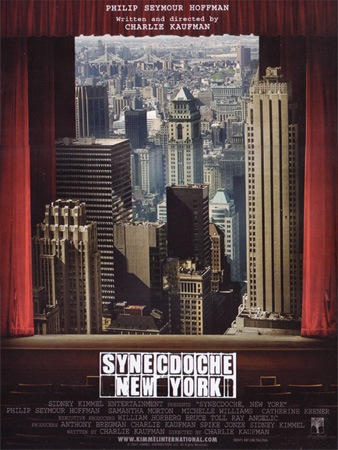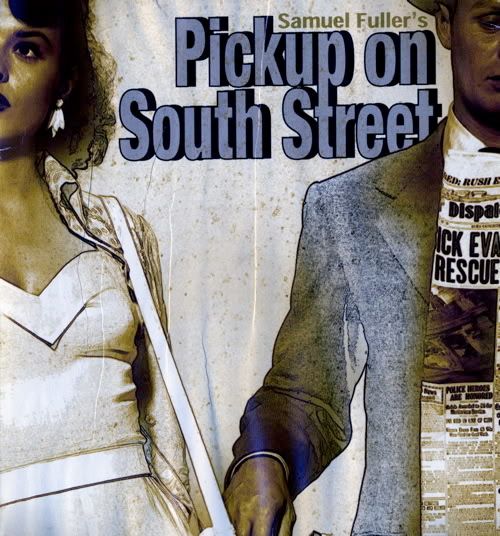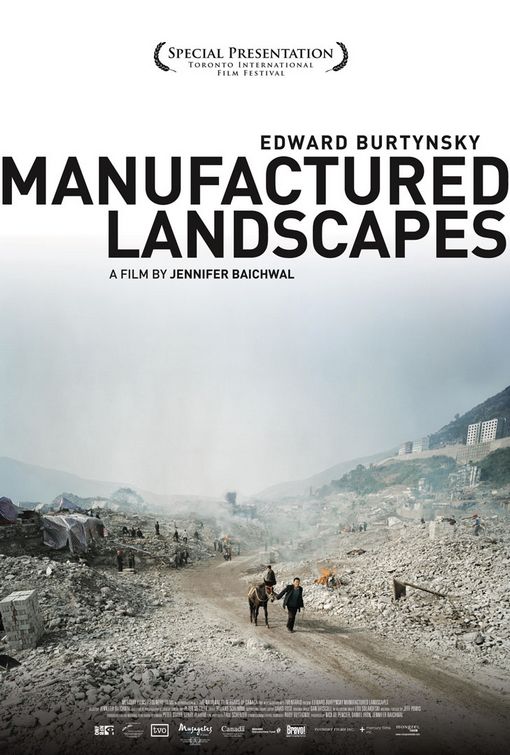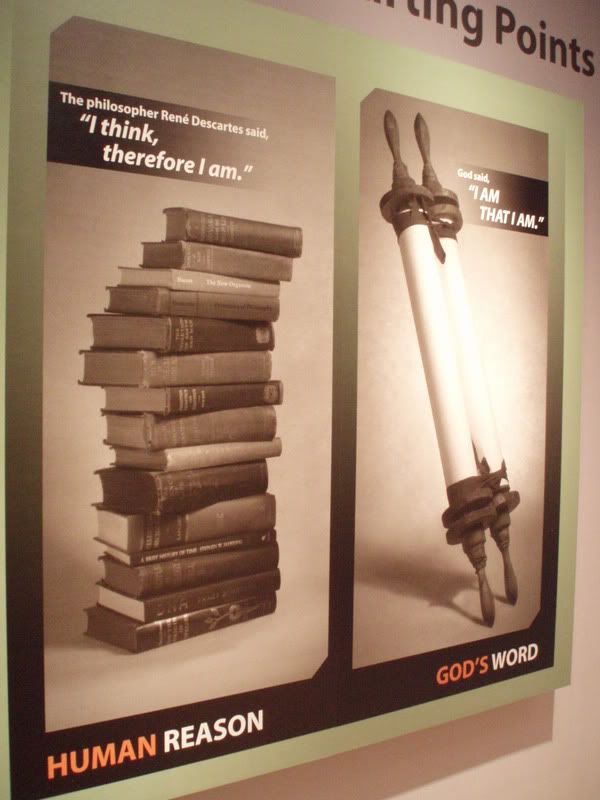(Sheldon Wolin's
Politics and Vision is one of the best political science/theory books I have ever read. I plan on reading it again and I am going to get his new book described below...)
Inverted Totalitarianism: A New Way of Understanding How the U.S. Is Controlled
By
Chalmers Johnson Truthdig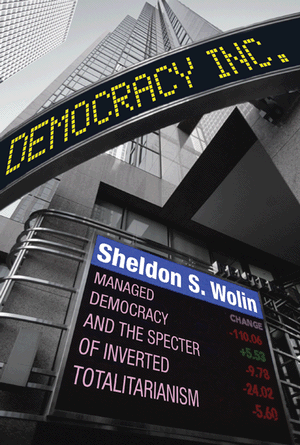
We now have a new, comprehensive diagnosis of our failings as a democratic polity by one of our most seasoned and respected political philosophers. For well over two generations, Sheldon Wolin taught the history of political philosophy from Plato to the present to Berkeley and Princeton graduate students (including me; I took his seminars at Berkeley in the late 1950s, thus influencing my approach to political science ever since). He is the author of the prize-winning classic Politics and Vision (1960; expanded edition, 2006) and Tocqueville Between Two Worlds (2001), among many other works.
His new book, Democracy Incorporated: Managed Democracy and the Specter of Inverted Totalitarianism, is a devastating critique of the contemporary government of the United States -- including what has happened to it in recent years and what must be done if it is not to disappear into history along with its classic totalitarian predecessors: Fascist Italy, Nazi Germany and Bolshevik Russia. The hour is very late and the possibility that the American people might pay attention to what is wrong and take the difficult steps to avoid a national Gtterdmmerung are remote, but Wolin's is the best analysis of why the presidential election of 2008 probably will not do anything to mitigate our fate. This book demonstrates why political science, properly practiced, is the master social science.
Wolin's work is fully accessible. Understanding his argument does not depend on possessing any specialized knowledge, but it would still be wise to read him in short bursts and think about what he is saying before moving on. His analysis of the contemporary American crisis relies on a historical perspective going back to the original constitutional agreement of 1789 and includes particular attention to the advanced levels of social democracy attained during the New Deal and the contemporary mythology that the U.S., beginning during World War II, wields unprecedented world power.
Given this historical backdrop, Wolin introduces three new concepts to help analyze what we have lost as a nation. His master idea is "inverted totalitarianism," which is reinforced by two subordinate notions that accompany and promote it -- "managed democracy" and "Superpower," the latter always capitalized and used without a direct article. Until the reader gets used to this particular literary tic, the term Superpower can be confusing. The author uses it as if it were an independent agent, comparable to Superman or Spiderman, and one that is inherently incompatible with constitutional government and democracy.
Wolin writes, "Our thesis is this: it is possible for a form of totalitarianism, different from the classical one, to evolve from a putatively 'strong democracy' instead of a 'failed' one." His understanding of democracy is classical but also populist, anti-elitist and only slightly represented in the Constitution of the United States. "Democracy," he writes, "is about the conditions that make it possible for ordinary people to better their lives by becoming political beings and by making power responsive to their hopes and needs." It depends on the existence of a demos -- "a politically engaged and empowered citizenry, one that voted, deliberated, and occupied all branches of public office." Wolin argues that to the extent the United States on occasion came close to genuine democracy, it was because its citizens struggled against and momentarily defeated the elitism that was written into the Constitution.
"No working man or ordinary farmer or shopkeeper," Wolin points out, "helped to write the Constitution." He argues, "The American political system was not born a democracy, but born with a bias against democracy. It was constructed by those who were either skeptical about democracy or hostile to it. Democratic advance proved to be slow, uphill, forever incomplete. The republic existed for three-quarters of a century before formal slavery was ended; another hundred years before black Americans were assured of their voting rights. Only in the twentieth century were women guaranteed the vote and trade unions the right to bargain collectively. In none of these instances has victory been complete: women still lack full equality, racism persists, and the destruction of the remnants of trade unions remains a goal of corporate strategies. Far from being innate, democracy in America has gone against the grain, against the very forms by which the political and economic power of the country has been and continues to be ordered." Wolin can easily control his enthusiasm for James Madison, the primary author of the Constitution, and he sees the New Deal as perhaps the only period of American history in which rule by a true demos prevailed.
To reduce a complex argument to its bare bones, since the Depression, the twin forces of managed democracy and Superpower have opened the way for something new under the sun: "inverted totalitarianism," a form every bit as totalistic as the classical version but one based on internalized co-optation, the appearance of freedom, political disengagement rather than mass mobilization, and relying more on "private media" than on public agencies to disseminate propaganda that reinforces the official version of events. It is inverted because it does not require the use of coercion, police power and a messianic ideology as in the Nazi, Fascist and Stalinist versions (although note that the United States has the highest percentage of its citizens in prison -- 751 per 100,000 people -- of any nation on Earth). According to Wolin, inverted totalitarianism has "emerged imperceptibly, unpremeditatedly, and in seeming unbroken continuity with the nation's political traditions."
The genius of our inverted totalitarian system "lies in wielding total power without appearing to, without establishing concentration camps, or enforcing ideological uniformity, or forcibly suppressing dissident elements so long as they remain ineffectual. A demotion in the status and stature of the 'sovereign people' to patient subjects is symptomatic of systemic change, from democracy as a method of 'popularizing' power to democracy as a brand name for a product marketable at home and marketable abroad. The new system, inverted totalitarianism, is one that professes the opposite of what, in fact, it is. The United States has become the showcase of how democracy can be managed without appearing to be suppressed."
Among the factors that have promoted inverted totalitarianism are the practice and psychology of advertising and the rule of "market forces" in many other contexts than markets, continuous technological advances that encourage elaborate fantasies (computer games, virtual avatars, space travel), the penetration of mass media communication and propaganda into every household in the country, and the total co-optation of the universities. Among the commonplace fables of our society are hero worship and tales of individual prowess, eternal youthfulness, beauty through surgery, action measured in nanoseconds, and a dream-laden culture of ever-expanding control and possibility, whose adepts are prone to fantasies because the vast majority have imagination but little scientific knowledge. Masters of this world are masters of images and their manipulation. Wolin reminds us that the image of Adolf Hitler flying to Nuremberg in 1934 that opens Leni Riefenstahl's classic film "Triumph of the Will" was repeated on May 1, 2003, with President George Bush's apparent landing of a Navy warplane on the flight deck of the USS Abraham Lincoln to proclaim "Mission Accomplished" in Iraq.
On inverted totalitarianism's "self-pacifying" university campuses compared with the usual intellectual turmoil surrounding independent centers of learning, Wolin writes, "Through a combination of governmental contracts, corporate and foundation funds, joint projects involving university and corporate researchers, and wealthy individual donors, universities (especially so-called research universities), intellectuals, scholars, and researchers have been seamlessly integrated into the system. No books burned, no refugee Einsteins. For the first time in the history of American higher education top professors are made wealthy by the system, commanding salaries and perks that a budding CEO might envy."
The main social sectors promoting and reinforcing this modern Shangri-La are corporate power, which is in charge of managed democracy, and the military-industrial complex, which is in charge of Superpower. The main objectives of managed democracy are to increase the profits of large corporations, dismantle the institutions of social democracy (Social Security, unions, welfare, public health services, public housing and so forth), and roll back the social and political ideals of the New Deal. Its primary tool is privatization. Managed democracy aims at the "selective abdication of governmental responsibility for the well-being of the citizenry" under cover of improving "efficiency" and cost-cutting.
We now have a new, comprehensive diagnosis of our failings as a democratic polity by one of our most seasoned and respected political philosophers. For well over two generations, Sheldon Wolin taught the history of political philosophy from Plato to the present to Berkeley and Princeton graduate students (including me; I took his seminars at Berkeley in the late 1950s, thus influencing my approach to political science ever since). He is the author of the prize-winning classic Politics and Vision (1960; expanded edition, 2006) and Tocqueville Between Two Worlds (2001), among many other works.
His new book, Democracy Incorporated: Managed Democracy and the Specter of Inverted Totalitarianism, is a devastating critique of the contemporary government of the United States -- including what has happened to it in recent years and what must be done if it is not to disappear into history along with its classic totalitarian predecessors: Fascist Italy, Nazi Germany and Bolshevik Russia. The hour is very late and the possibility that the American people might pay attention to what is wrong and take the difficult steps to avoid a national Gtterdmmerung are remote, but Wolin's is the best analysis of why the presidential election of 2008 probably will not do anything to mitigate our fate. This book demonstrates why political science, properly practiced, is the master social science.
Wolin's work is fully accessible. Understanding his argument does not depend on possessing any specialized knowledge, but it would still be wise to read him in short bursts and think about what he is saying before moving on. His analysis of the contemporary American crisis relies on a historical perspective going back to the original constitutional agreement of 1789 and includes particular attention to the advanced levels of social democracy attained during the New Deal and the contemporary mythology that the U.S., beginning during World War II, wields unprecedented world power.
Given this historical backdrop, Wolin introduces three new concepts to help analyze what we have lost as a nation. His master idea is "inverted totalitarianism," which is reinforced by two subordinate notions that accompany and promote it -- "managed democracy" and "Superpower," the latter always capitalized and used without a direct article. Until the reader gets used to this particular literary tic, the term Superpower can be confusing. The author uses it as if it were an independent agent, comparable to Superman or Spiderman, and one that is inherently incompatible with constitutional government and democracy.
Wolin writes, "Our thesis is this: it is possible for a form of totalitarianism, different from the classical one, to evolve from a putatively 'strong democracy' instead of a 'failed' one." His understanding of democracy is classical but also populist, anti-elitist and only slightly represented in the Constitution of the United States. "Democracy," he writes, "is about the conditions that make it possible for ordinary people to better their lives by becoming political beings and by making power responsive to their hopes and needs." It depends on the existence of a demos -- "a politically engaged and empowered citizenry, one that voted, deliberated, and occupied all branches of public office." Wolin argues that to the extent the United States on occasion came close to genuine democracy, it was because its citizens struggled against and momentarily defeated the elitism that was written into the Constitution.
"No working man or ordinary farmer or shopkeeper," Wolin points out, "helped to write the Constitution." He argues, "The American political system was not born a democracy, but born with a bias against democracy. It was constructed by those who were either skeptical about democracy or hostile to it. Democratic advance proved to be slow, uphill, forever incomplete. The republic existed for three-quarters of a century before formal slavery was ended; another hundred years before black Americans were assured of their voting rights. Only in the twentieth century were women guaranteed the vote and trade unions the right to bargain collectively. In none of these instances has victory been complete: women still lack full equality, racism persists, and the destruction of the remnants of trade unions remains a goal of corporate strategies. Far from being innate, democracy in America has gone against the grain, against the very forms by which the political and economic power of the country has been and continues to be ordered." Wolin can easily control his enthusiasm for James Madison, the primary author of the Constitution, and he sees the New Deal as perhaps the only period of American history in which rule by a true demos prevailed.
To reduce a complex argument to its bare bones, since the Depression, the twin forces of managed democracy and Superpower have opened the way for something new under the sun: "inverted totalitarianism," a form every bit as totalistic as the classical version but one based on internalized co-optation, the appearance of freedom, political disengagement rather than mass mobilization, and relying more on "private media" than on public agencies to disseminate propaganda that reinforces the official version of events. It is inverted because it does not require the use of coercion, police power and a messianic ideology as in the Nazi, Fascist and Stalinist versions (although note that the United States has the highest percentage of its citizens in prison -- 751 per 100,000 people -- of any nation on Earth). According to Wolin, inverted totalitarianism has "emerged imperceptibly, unpremeditatedly, and in seeming unbroken continuity with the nation's political traditions."
The genius of our inverted totalitarian system "lies in wielding total power without appearing to, without establishing concentration camps, or enforcing ideological uniformity, or forcibly suppressing dissident elements so long as they remain ineffectual. A demotion in the status and stature of the 'sovereign people' to patient subjects is symptomatic of systemic change, from democracy as a method of 'popularizing' power to democracy as a brand name for a product marketable at home and marketable abroad. The new system, inverted totalitarianism, is one that professes the opposite of what, in fact, it is. The United States has become the showcase of how democracy can be managed without appearing to be suppressed."
Among the factors that have promoted inverted totalitarianism are the practice and psychology of advertising and the rule of "market forces" in many other contexts than markets, continuous technological advances that encourage elaborate fantasies (computer games, virtual avatars, space travel), the penetration of mass media communication and propaganda into every household in the country, and the total co-optation of the universities. Among the commonplace fables of our society are hero worship and tales of individual prowess, eternal youthfulness, beauty through surgery, action measured in nanoseconds, and a dream-laden culture of ever-expanding control and possibility, whose adepts are prone to fantasies because the vast majority have imagination but little scientific knowledge. Masters of this world are masters of images and their manipulation. Wolin reminds us that the image of Adolf Hitler flying to Nuremberg in 1934 that opens Leni Riefenstahl's classic film "Triumph of the Will" was repeated on May 1, 2003, with President George Bush's apparent landing of a Navy warplane on the flight deck of the USS Abraham Lincoln to proclaim "Mission Accomplished" in Iraq.
On inverted totalitarianism's "self-pacifying" university campuses compared with the usual intellectual turmoil surrounding independent centers of learning, Wolin writes, "Through a combination of governmental contracts, corporate and foundation funds, joint projects involving university and corporate researchers, and wealthy individual donors, universities (especially so-called research universities), intellectuals, scholars, and researchers have been seamlessly integrated into the system. No books burned, no refugee Einsteins. For the first time in the history of American higher education top professors are made wealthy by the system, commanding salaries and perks that a budding CEO might envy."
The main social sectors promoting and reinforcing this modern Shangri-La are corporate power, which is in charge of managed democracy, and the military-industrial complex, which is in charge of Superpower. The main objectives of managed democracy are to increase the profits of large corporations, dismantle the institutions of social democracy (Social Security, unions, welfare, public health services, public housing and so forth), and roll back the social and political ideals of the New Deal. Its primary tool is privatization. Managed democracy aims at the "selective abdication of governmental responsibility for the well-being of the citizenry" under cover of improving "efficiency" and cost-cutting.
Managed democracy is a powerful solvent for any vestiges of democracy left in the American political system, but its powers are weak in comparison with those of Superpower. Superpower is the sponsor, defender and manager of American imperialism and militarism, aspects of American government that have always been dominated by elites, enveloped in executive-branch secrecy, and allegedly beyond the ken of ordinary citizens to understand or oversee. Superpower is preoccupied with weapons of mass destruction, clandestine manipulation of foreign policy (sometimes domestic policy, too), military operations, and the fantastic sums of money demanded from the public by the military-industrial complex. (The U.S. military spends more than all other militaries on Earth combined. The official U.S. defense budget for fiscal year 2008 is $623 billion; the next closest national military budget is China's at $65 billion, according to the Central Intelligence Agency.)
Foreign military operations literally force democracy to change its nature: "In order to cope with the imperial contingencies of foreign war and occupation," according to Wolin, "democracy will alter its character, not only by assuming new behaviors abroad (e.g., ruthlessness, indifference to suffering, disregard of local norms, the inequalities in ruling a subject population) but also by operating on revised, power-expansive assumptions at home. It will, more often than not, try to manipulate the public rather than engage its members in deliberation. It will demand greater powers and broader discretion in their use ('state secrets'), a tighter control over society's resources, more summary methods of justice, and less patience for legalities, opposition, and clamor for socioeconomic reforms."
Imperialism and democracy are, in Wolin's terms, literally incompatible, and the ever greater resources devoted to imperialism mean that democracy will inevitably wither and die. He writes, "Imperial politics represents the conquest of domestic politics and the latter's conversion into a crucial element of inverted totalitarianism. It makes no sense to ask how the democratic citizen could 'participate' substantively in imperial politics; hence it is not surprising that the subject of empire is taboo in electoral debates. No major politician or party has so much as publicly remarked on the existence of an American empire."
To Read the Entire ReviewMore:
To Read the First Chapter of Democracy IncorporatedTo Read the First Chapter of Politics and Vision

